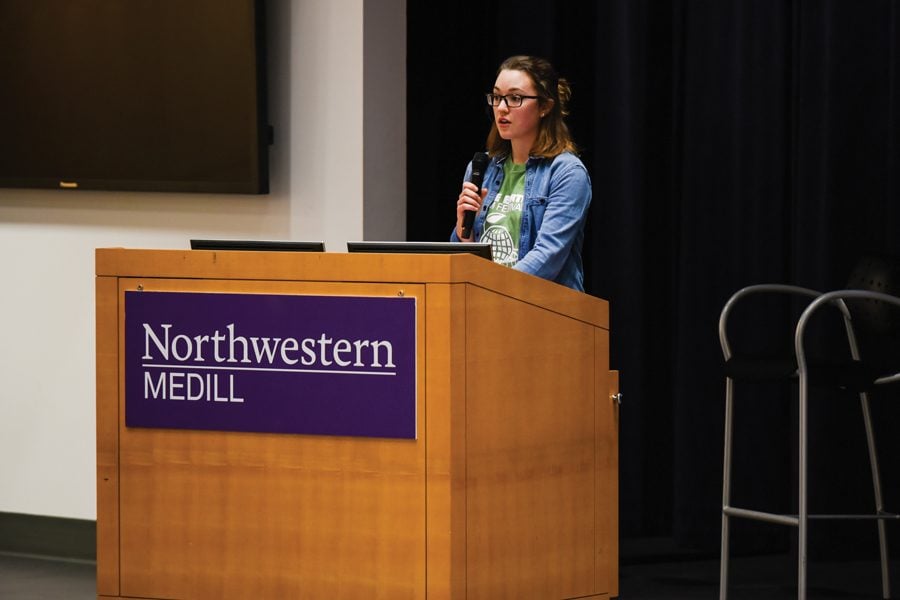Northwestern screens climate change movie as part of One Earth Film Festival
Brian Meng/The Daily Northwestern
Isabella Masini speaks at a screening of former Vice President Al Gore’s film “An Inconvenient Sequel: Truth to Power.” Masini is a site coordinator of the One Earth Film Festival — a Chicago-area festival aiming to educate the public on environmental issues.
March 9, 2018
Members of the public and the Northwestern community watched “An Inconvenient Sequel: Truth to Power” and discussed climate crisis at the McCormick Foundation Center on Thursday.
About 80 people attended the screening of the film, which is the 2017 follow-up to former Vice President Al Gore’s 2006 movie on climate change, “An Inconvenient Truth.” As part of the Chicago-based One Earth Film Festival, which aims to educate the public on environmental issues, the event included a discussion about climate change led by environmental experts.
The event was co-hosted by sustainNU and the Institute for Sustainability and Energy at Northwestern. Various student organizations, including the Associated Student Government Sustainability Committee and Students for Ecological and Environmental Development, also supported the event.
Sustainability communications manager Stephanie Folk said at the event that sustainNU was working “on many fronts,” including reducing waste and increasing the energy efficiency of buildings, to lessen the University’s carbon footprint.
Part of sustainNU’s mission is to educate people about environmental issues, Folk told The Daily, which was a reason they were interested in screening the film.
“We have a lot of goals at Northwestern related to reducing our carbon footprint,” Folk said. “This film seemed like something that would address that issue and would be of interest to a lot of people on campus.”
One Earth Film Festival site coordinator Isabella Masini told The Daily that the festival organizers chose to screen the film at NU partially because they enjoyed working with educational institutions, where students are “always engaged and (want) to learn … about current issues.” They had worked with NU before and had a “great turnout,” she added.
The discussion included local experts to explain the effects of climate change on a more personal level, Masini added, as the film’s scale is much broader and more global.
“(The film) is very much talking about climate change. It’s also talking about policy a lot,” Masini said. “(The experts) are taking something that’s worldly and bringing it back down to what other individuals can see in front of their faces.”
Lucia Whalen, who is part of the Climate Reality Project, an organization founded by Al Gore to promote environmental involvement, said at the event that individuals should not feel overwhelmed by larger political issues. People can engage their local communities and work to combat climate change in their own ways, she added.
“You don’t have to be a politician,” Whalen said. “You might be an artist. You might be a writer. … Everybody has their unique gifts that we need brought to the table, and when we only look to politics, or when we only look at this issue from one perspective, then we don’t make a big difference.”
Email: [email protected]
Twitter: @thisisalane


